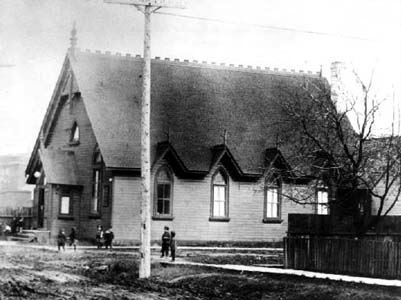Search | Image Archive | Reference | Communities | POV | Lesson Plans | Credits
 James S. Woodsworth reflected in the final chapter of his 1909 work Strangers Within Our Gates on "The Challenge to the Church." The challenge that he perceived was for the main-line churches in Canada to expand their role beyond being simple dispensers of charity to being leaders in the task of building citizenship among non-English speaking immigrant communities.
James S. Woodsworth reflected in the final chapter of his 1909 work Strangers Within Our Gates on "The Challenge to the Church." The challenge that he perceived was for the main-line churches in Canada to expand their role beyond being simple dispensers of charity to being leaders in the task of building citizenship among non-English speaking immigrant communities.
One program that Woodsworth conceived to meet this challenge was called the Peoples' Forum. It began in the fall of 1910 as a series of Sunday afternoon lectures sponsored by the All Peoples' Mission (where Woodsworth was superintendent) and held at the Grand Theatre at the corner of Jarvis Avenue and Main Street in the heart of the city's North End.
These lectures tackled a wide variety of topics, including political theory, current events, history, art, literature and musica Lecturers included personalities ranging from Salem Bland, a prominent proponent of the Social Gospel and lecturer in Theology at Wesley College to John W. Dafoe, the editor of the Liberal Manitoba Free Press. Many of the lectures were illustrated with lantern slides or other visual aids to add interest and to assist those whose English was limited. A lively discussion followed each lecture, and often the afternoon lectures were followed by an evening performance featuring the music and dance of one of the non-English ethnic communities.
The People's Forum was unapologetically assimilationist in its goals from the beginning. By encouraging recent immigrants to participate in programmes that celebrated the culture of the Anglo-Canadian charter group, it sought also to communicate the values of this culture, which included industry, independence, and respect for private property.
At the same time, the People's Forum was a venue for the expression of many liberal opinions. Whether it was Labour MLA Fred Dixon speaking about single taxation in "The Parliament of Man," Winona Flett speaking on the "The Role of Women in Industrial Society" or Dr. Mary Crawford lecturing on birth control, the Forum challenged social inequities and served as a platform for advocates of the rights of women, industrial workers and the poor.
By 1914, the People's Forum had become an institution in its own right incorporated separately from the All People's Mission. Woodsworth served as the first president, with Fred Dixon as secretary and program co-ordinator. Membership dues were set at one dollar per year, although admission at the regular Sunday afternoon lectures remained free so as to be accessible to all. It became the centre of a new movement wherein labour and reform groups turned to adult education as a means of improving the lives of working people and disseminating their vision of a fairer society.
The People's Forum was a unique institution in that it brought together, often for the first time, people from all sectors of Winnipeg society, blending people of different social classes, religions and national origins. Its lesson was not lost on progressive leaders from other Canadian cities, and the model spread to several other Canadian cities after 1915, including Toronto and Montréal.
Page revised: 27 August 2009